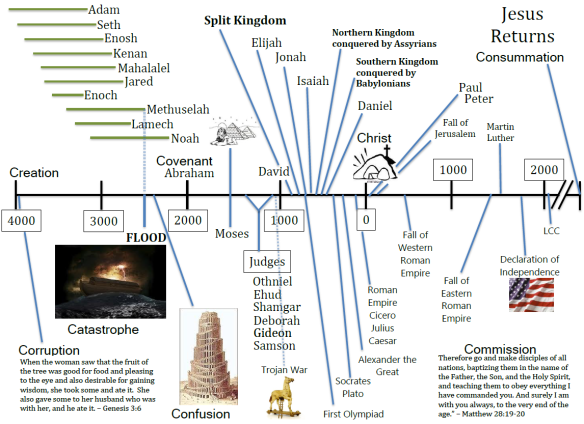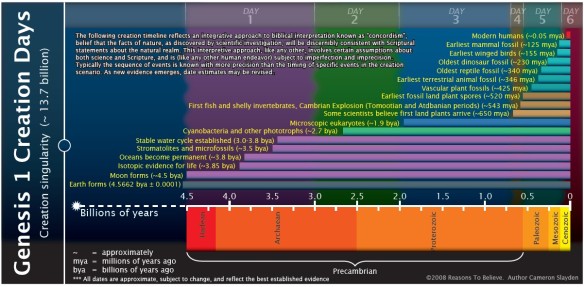Toward Better Interpretations
As Christians, we should all be like the Berians in Acts 17 – examining the scriptures everyday to make sure that the words spoken are true. Dr. Ross has written words in a book, so we will examine the scriptures to see if what he has said is true. The following is a picture from p53

I agree with the bullet point list that Dr. Ross has included. This is a good start, and a point of agreement between biblical creationists and old earth advocates.
On the same page, Dr. Ross writes
Second, the Bible also declares that the record of nature is a reliable and understandable means for God to speak to people
He goes on to list Psalm 19:1-4 and Romans 1:18-20 as confirmation of this statement. But what does he mean by “record of nature”?
As already noted in the Introduction and The Creedal Climate, Ross views the record of nature as the 67th book of scripture – with the same authority as the eternal word, so I won’t go into that same rebuttal here. What I will say is that what Ross means is
record of nature = “the old age interpretation of observations”
But this is NOT true. The record of nature looks exactly as one would expect from a biblical creationist’s perspective.
Ross then raises three reasons why there is a controversy between old and young earth proponents:
- Language Barriers
- Human Limitations
- Inadequate Testing
Language Barrier
In the section on language barriers, he attributes the disagreement between old and young earth views to the English language.
By no coincidence does the creation-day controversy rage most fiercely among English-speaking Christians. Such readers of the Bible may be unaware of the nuances of meaning in the various Hebrew verbs used to describe God’s creative activities in Genesis 1 and 2.
There are English speaking scholars, to whom this topic is quite important, and Dr. Steven Boyd is one such scholar. In his technical paper: Statistical Determination of Genre in Biblical Hebrew: Evidence for an Historical Reading of Genesis 1:1-2:3, Dr. Boyd has determined with 99.9973% accuracy that the text itself is narrative as opposed to poetic.

While I’m quite sure many English speakers are unaware of nuances in the Hebrew language, I’m not nearly as sure that Dr. Ross is aware that the Hebrew calendar is different from the more common (in the west) Gregorian calendar in use today. The Gregorian calendar year, as I write this is 2020. The Hebrew calendar is calibrated to count years forward from the creation week, and the current Hebrew calendar year is 5780. And while modern Hebrew language is not exactly like the biblical Hebrew, it is easily recognizable as the same language. So, the Hebrew-speaking people, who are more familiar with Hebrew language nuance celebrate 5780 years since creation. So, Dr. Ross, shouldn’t claim authority in the Hebrew language, when the Hebrew calendar strongly supports biblical creation rather than old earthism.
In the very next sentence, Dr. Ross says of the Hebrew word “yom”:
With so many words in English to describe long time periods (having specific start and end points), many readers don’t realize that in biblical Hebrew only once such word exists.
This is totally false!
There are several Hebrew words that describe long time periods
- Zeman H2165 – appoint time, season (Ecc 1:1)
- Eth H6256 – time, occurance (Ecc 1:1)
- Qedem – Ancient
- Olam – days of old
- Tor – Generations of days/nights
- Tamid – Continuation of days
- Ad – forever
- Shanah – Year, or in the plural could mean a very long time
Yet, God chose to communicate his creative works as having taken six days, which is a word that has clear meaning both in the Genesis 1 text and confirmed to be ordinary days in Exodus 20:11. To communicate something like what Dr. Ross proposes, God could have chosen to use
- Any one of those Hebrew words for long time periods as shown above
- Plural of “yom” in conjunction with a word for a great multitude of days
- Poetic language of a great magnitude of days like He did with Abram: Gen 15:5 (stars of the sky, sand on the seashore)
But this is not the case. God used the word “yom” and it has definite boundaries of meaning, which do not include billions of years. Nowhere in scripture can we find anything that means what Dr. Ross would like to attribute to the word “yom”. He has no exegetical grounds to make this claim.
Human Limitations
In this section, Dr. Ross tells a story of “more than one young-earth creationist leader”, who is unwilling to study further or have ongoing dialogue. It sounds like he is leaning towards using the sweeping generalization fallacy against ALL young-earth creationists: Since a few think this way, they ALL must think this way. Had he done any reading on the teachings of biblical creationists at ICR, AIG, or CMI, he would know that Bible study is very important to these well-qualified scientists and scholars.
I wonder if Dr. Ross is willing to reconsider his view based on the rebuttals included herein (or by other faithful Christian scientists/scholars)…or if Dr. Ross’s encouragement for people to “overcome biased and incomplete interpretations” is intended only for his opponents.
Testing Interpretations
In the first part of this section, I am in agreement with Dr. Ross when referring to John Moore’s analysis of creation vs. evolution, where Moore says “(creation) is based on faith” and “(evolution) is based on confirmable evidence.” Dr. Ross writes:
Current culture subscribes to this false dichotomy: facts and faith don’t mix. Yet the Bible claims that faith is built on reasonable evidence. Both the Old and New Testaments emphasize the importance of testing, of making sure the evidence supports the truth claims.
The creation account in Genesis is eye-witness testimony from the Almighty, who knows everything, and is eternally faithful. We can trust his revelation from the historical account in Genesis…so we would expect the observations of evidence to match his revelation. This is exactly what is observed today
Conversely, those who claim that science has disproved the Bible, or in Dr. Ross’s case – forced a radical re-interpretation of scripture to accommodate the modern paradigm, are burdened with conflicting observations:
Ross continues:
Both the and New Testaments emphasize the importance of testing, of making sure the evidence supports truth claims. Moses instructed the Israelites to test individuals who claimed to be speaking or writing under divine inspiration (Deuteronomy 18:21-22). The prophet Malachi quoted God as saying,
“Test me in this” (Malachi 3:10). The apostle Paul urged Christ’s followers, “Test everything. Hold on to the good” (1 Thessalonians 5:21). The apostle John similarly wrote, “Test the spirits to see whether they are from God” (1John 4:1).
I agree, that we should test. The Bible is correct again! Where Dr. Ross stumbles, is the STANDARD by which we are to test. His claims are that we should test against the findings of modern academic paradigms. As Christians, we should test against SCRIPTURE. The standard is God’s special revelation in his eternal Word…not the ever-changing interpretations of observations.
To be fair to Dr. Ross, he does not entirely miss the importance of testing against the scriptures as he writes:
In addition, Luke affirmed the importance of testing by complimenting people in Berea who “examined the Scriptures every day to see if what Paul said was true” (Acts 17:11). The Bereans set an important example for us as they tested Paul’s words and checked his teaching against the law, history, songs, and prophecies preserved through the centuries with confirmed accuracy
Even in that quote, we can see that Ross expects outside sources to be accurate authorities by which scripture can be confirmed. But outside sources (indeed all of creation) must bend the knee to God and his eternal Word.
Later on p57, I find myself again agreeing with Dr. Ross when he pens
History reveals that the scientific method of investigation-a method developed by Renaissance men well-grounded in God’s Word-has its roots in Scripture. Biblical convictions and values, as well as intellectual drive and prowess, gave rise to the scientific age. The modern scientific revolution emerged at both the times and locations of the Protestant Reformation. Scottish theologian Thomas Torrance and an interdisciplinary team of scholars have documented how Christian theology (and Reformed theology in particular) played a critical role in the birth and development of the scientific method that led to amazing advances.
God’s revelation permits and encourages science. Believers need not fear science. ALL truth is God’s truth, and the more that is discovered, the more God’s special revelation is corroborated. The more we can glorify God for his amazing designs
In his section titled “Evaluating Interpretations”, Ross writes
Much of the conflict concerning the creation account comes from the presumption that the biblical teaching on creation resides primarily in Genesis 1 and 2. Christians and non-Christians tend to develop their interpretations of Genesis 1 and 2 without testing them for consistency with the other 21 creation-relevant passages in the Bible.
Ross then includes the chart on the following page:

Since this section is titled evaluating interpretations, let’s evaluate this chart. As Hebrew scholars note, Genesis 1-11 is intended by the author for his readers to see the text as historical narrative and not poetry. The rest of Genesis is also history, but old earthers want to arbitrarily segment Genesis 1-11 as somehow metaphorical in nature to avoid the refutation of their view that comes with consistency. So, Genesis is historical narrative and should be read as intended: history. This is in opposition to the Psalms, which are considered poetic in nature. In Ross’s interpretations, he values Psalm 104 above all other creation-relevant passages because he feels this passage restricts the worldwide flood of Noah’s day to a mere local flood. However, in the same passage that Dr. Ross feels in ironclad proof, Psalm 104 includes these poetic phrases:
- You (the LORD) are clothed with splendor
- He wraps Himself in light as with a garment
- He stretches out the heavens like a tent
- He lays the beams of his upper chambers on their waters
- He makes the clouds his chariot and rides on the wings of the wind
- He makes the winds his messengers, flames of fire his servants
All of these statements are true, but they are not literal. They are poetic and should be interpreted as such. Yet, counter to proper hermeneutics, Dr. Ross re-interprets the historical account of Genesis 6-9 (and Isaiah 54:9 and 2 Peter 3:5-6) based on this graphically symbolic poetry and mandates that the rest of Psalm 104 is giving historical & chronological accounting. Not good exegesis.
Digging deeper into his chart, Dr. Ross denotes that Genesis 3 tells of the introduction of sin into God’s very good creation. We know that God’s creation (prior to sin) was “very good” because seven times in Genesis 1, God calls his creation “good” and on the pinnacle seventh time, He says “very good.” And we know that animals and humans were mandated to consume fruits, nuts, and vegetables prior to the rebellion of mankind. But Dr. Ross believes there was millions of years death, cancer, suffering, predation and thorns prior to the sin of mankind. Yet, Genesis 3 tells us specifically that the curse of sin is death, suffering, and thorns. How does Dr. Ross get away with such extreme contradictions? He unsuccessfully tries to accommodate death, disease, suffering and thorns as “Very Good” in Chapter 9. We’ll cover more about that in a couple of chapters. But even now, you can see that he simply inserts his own assumptions & definitions into the text in DIRECT OPPOSITION to the actual words to save his old earth theory.
Looking again at the chart, why would Dr. Ross NOT include key creation-relevant verses like Exodus 20:11, Exodus 31:17, Isaiah 54:9, Matthew 23:35, Matthew 24:38-39, & Mark 10:6? Could it be that he avoided them because they refute his old earth theory? We’ll discuss these specific passages in the subsequent chapters when Dr. Ross does finally recognize and try to account for them.
Testability and Predictability
In this section Ross writes a plea to those who are interested in testing opposing creation models.
One of the most important tests of an interpretive model (detailed interpretation of a particular phenomenon or a related set of phenomena) is how well the model survives vigorous attempts to falsify it and how accurately it ‘predicts’, or anticipates, discoveries.
That’s not an unfair statement, but before considering falsifiability, one must have an ultimate authority. For the Christian, the ultimate authority is God and his Word. So, before any testing of conflicting creation models empirically, the models must be consistent with scripture. As shown and will continue to be shown as the review continues, old earthism fails to be consistent with scripture UNLESS massive redefinitions of key words and passages is performed.
As biblical creationists, we can praise God for the consistent nature of his revelation. We do not have to redefine the words in the Bible to accommodate modern academic paradigms or cultural changes in sexuality or political revolutions as we have seen Dr. Ross do. God’s Word is eternal and we can trust God to keep his word regarding the future since we can trust his revelation from the past.
Back to Table of Contents














